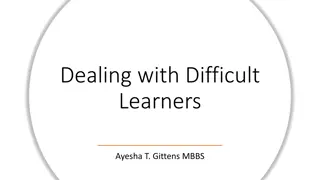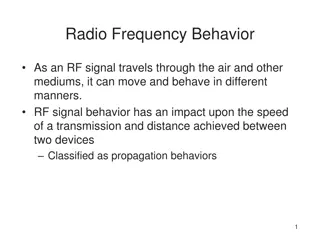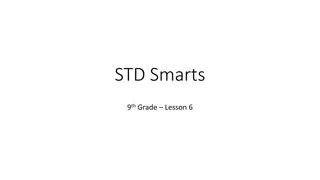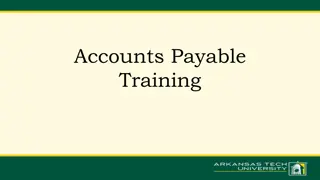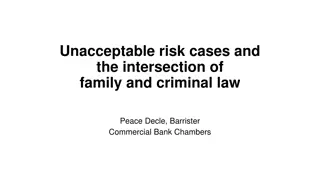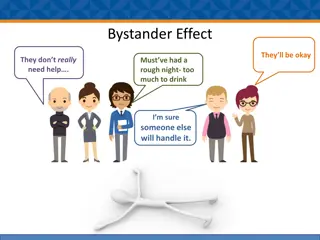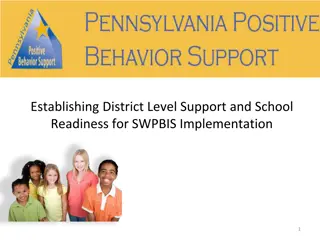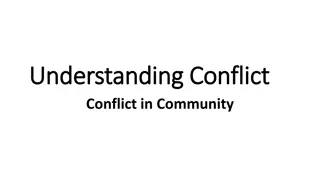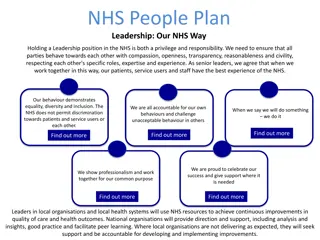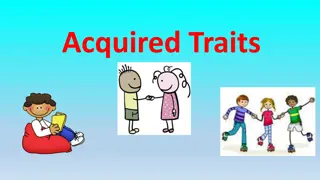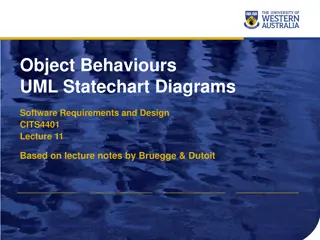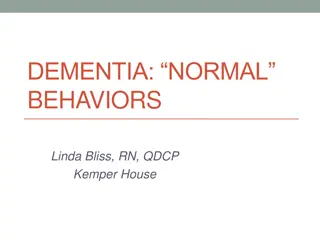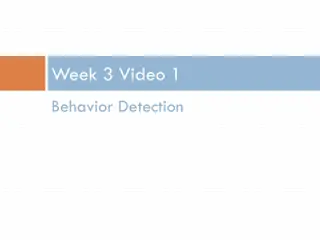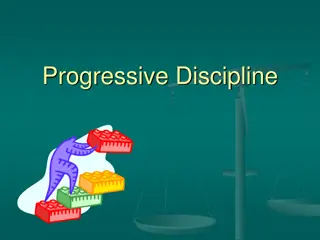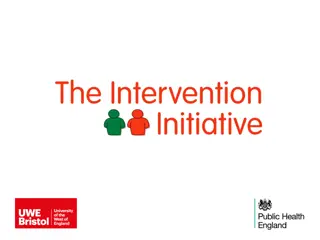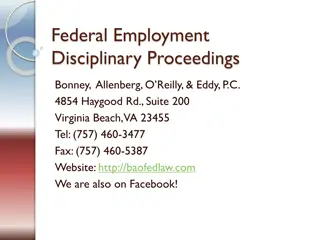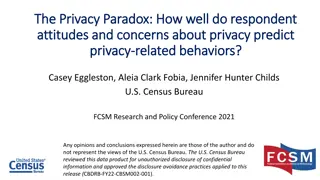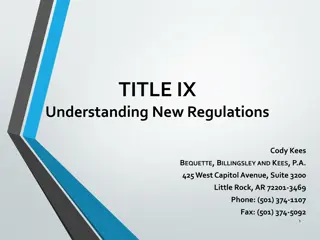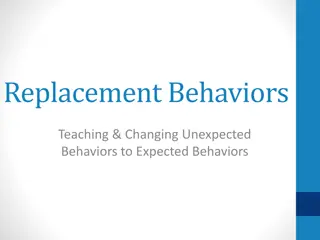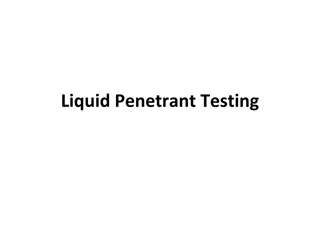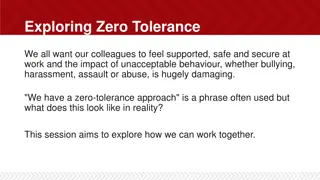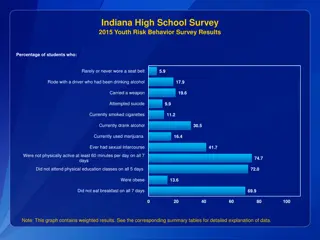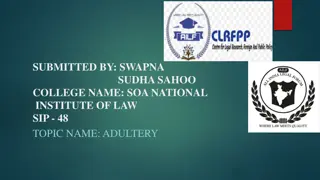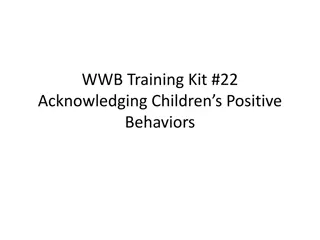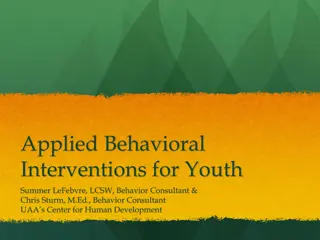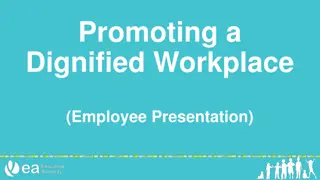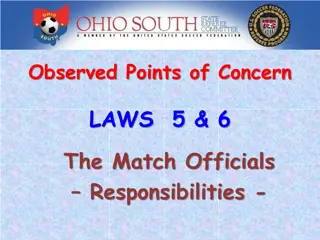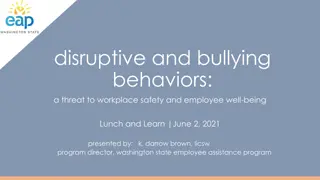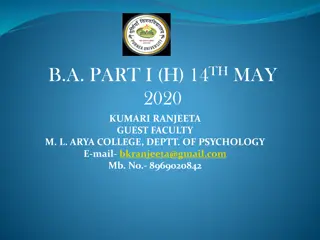Understanding and Managing Difficult Learner Behaviors in Adult Education
Dealing with difficult learners in adult education settings can impact the learning experience for all. This guide covers types of challenging behaviors, identifying underlying causes, and strategies for maintaining a constructive educational environment. By addressing disruptive behaviors effective
1 views • 32 slides
Understanding Changes in Domestic Abuse Practices Over the Last 2 Years
In the realm of domestic abuse and coercive control, there have been notable developments in practice over the past two years. From defining behaviors that constitute domestic abuse to recognizing economic abuse and the impact of coercive and controlling behaviors, the legal landscape has evolved to
6 views • 30 slides
Understanding Radio Frequency Behavior and Propagation Behaviors
Radio frequency signals exhibit various behaviors as they travel through different mediums, affecting transmission speed and distance between devices. Propagation behaviors include absorption, reflection, scattering, refraction, and diffraction, impacting wireless network performance. Understanding
2 views • 32 slides
STD Smarts 9th Grade Lesson: Risky Behaviors and STD Testing
In this 9th grade lesson on STD Smarts, students explore risky behaviors related to STD transmission and delve into the importance of STD testing. The lesson covers various scenarios and myths surrounding STDs, challenging students to consider their choices and knowledge about sexual health. Through
0 views • 32 slides
Understanding Sexual Violence and Harassment in Educational Settings
Sexual violence and harassment, including rape, sexual assault, and unwanted sexual behaviors, are serious issues that can affect anyone. This content highlights what sexual violence is, who can experience it, and the impact it has on students in educational environments. It also covers sexual haras
1 views • 27 slides
Accounts Payable Procedures and Documentation Overview
The Accounts Payable department's primary mission is to ensure timely and accurate processing of payments in compliance with University, federal, and state regulations. This involves requesting payments for various types of expenses, following specific procedures for Purchase Orders and Non-Purchase
1 views • 11 slides
Understanding Unacceptable Risk Cases at the Intersection of Family and Criminal Law
Exploring the complexities of unacceptable risk cases where family and criminal law meet, with a focus on the legislative pathway, standard of proof, parenting considerations, and the paramount importance of the child's best interests. The discussion delves into assessing risks, deciding on parentin
1 views • 27 slides
Bystander Intervention Strategies for Challenging Situations
Learn about the bystander effect, the 4Ds of bystander intervention (Direct, Distract, Delay, Delegate), and effective ways to address unacceptable behavior. Empower yourself to take action and support those in need by understanding these strategies and utilizing them in various scenarios.
0 views • 6 slides
Understanding Cost Transfers in Sponsored Projects
Cost transfers, also known as expenditure transfers, are the process of moving expenses from one project to another. It is crucial to follow guidelines to ensure proper documentation and approval to avoid audit issues. Learn when cost transfers are acceptable or unacceptable, how to complete the nec
0 views • 6 slides
SWPBIS Implementation: Establishing District Support and School Readiness
Positive Behavioral Interventions and Supports (PBIS) focuses on creating effective environments to encourage appropriate behaviors. SWPBIS extends this approach to whole schools, applying systemic strategies to achieve positive outcomes and prevent problem behaviors. It is not a quick fix or just a
2 views • 18 slides
Understanding Conflict in Community
Conflict arises when beliefs or actions of one group are resisted or unacceptable to another, leading to friction and discord. Individuals or groups engage in conflicting acts due to inconsistent wants, needs, or obligations. Conflict theory explains how tensions from uneven distribution of resource
0 views • 23 slides
Understanding Multiple Baseline Designs in Behavioral Experiments
Multiple Baseline Designs are a type of experimental design used in behavioral research. This design involves measuring two or more behaviors concurrently in a baseline condition, applying a treatment variable to one behavior at a time while maintaining baseline conditions for others, and then seque
0 views • 34 slides
Promoting Equality and Inclusion in NHS Leadership
Holding a leadership position in the NHS is a privilege and responsibility. The NHS emphasizes compassion, openness, transparency, and respect for diversity. Discrimination is not tolerated, and accountability for behavior is key. Leaders prioritize continuous improvement in quality of care and heal
0 views • 6 slides
Managing Difficult Employees and Disruptive Behaviors
Identify common types of difficult and disruptive employee behaviors, discuss the potential impact on the organization, and offer tips for constructive management in the workplace. Explore behaviors like gossiping, incivility, bullying, insubordination, and arrogance. Understand the metrics and lega
1 views • 20 slides
Understanding Acquired Traits and Learned Behaviors in Living Organisms
Acquired traits are physical characteristics acquired during a living thing's lifetime, such as scars, and are not passed down from parents. Many acquired traits are also learned behaviors, like reading or flying, which animals develop after birth. Learned behaviors, unlike inherited instincts, are
5 views • 15 slides
Understanding Object Behaviors and Statechart Diagrams in Software Design
Object behaviors and UML statechart diagrams play a crucial role in software requirements and design. State machines, transitions, events, and states are essential concepts in modeling object behavior in response to external events. By utilizing UML statechart diagrams, one can effectively represent
0 views • 23 slides
Understanding Risk Assessment in Child Custody Cases
This content delves into the crucial aspect of risk assessment in child custody cases, highlighting the legislative framework, factors considered, and the importance of protecting children from harm. It discusses key points from legal cases and emphasizes the complex nature of determining and measur
0 views • 35 slides
Understanding Normal Behaviors in Dementia Care
Dementia presents a range of normal behaviors that can be challenging for caregivers. By learning to identify triggers, interpret communication, and respond effectively, caregivers can provide better support for individuals with dementia. This session explores common behaviors like aggression, wande
0 views • 29 slides
Understanding Behavior Detection Models in Educational Settings
Explore how behavior detectors automatically infer student behaviors from interaction logs, such as disengaged behaviors like Gaming the System and Off-Task Behavior, as well as Self-Regulated Learning (SRL) behaviors like Help Avoidance and Persistence. Discover the goal of identifying these behavi
0 views • 18 slides
Understanding Progressive Discipline in the Workplace
Progressive discipline is a formal process that involves steps to address employee performance issues effectively. It helps in documenting and addressing unacceptable behavior, preventing the hiring of problematic employees, and improving organizational objectives. The process includes setting perfo
0 views • 35 slides
Promoting Healthy Social Norms in Group Settings
This program aims to foster healthy and positive social norms by discussing sensitive issues in a respectful manner. Ground rules like confidentiality and appropriate communication are set to ensure a safe space. Through understanding and addressing unacceptable behaviors, the goal is to create a cu
0 views • 31 slides
Federal Employment Disciplinary Proceedings and Union Stewards Overview
This comprehensive guide covers common issues faced by union stewards in federal employment disciplinary proceedings, including proposed actions, Collective Bargaining Agreement violations, EEO complaints, and disciplinary actions for federal and NAF employees. It outlines the process for misconduct
0 views • 17 slides
Understanding the Privacy Paradox: Attitudes vs. Behaviors
Social scientists have identified a Privacy Paradox where individuals with strong privacy concerns may not always engage in behaviors that protect their privacy. While some studies show a discrepancy between attitudes and behaviors, others suggest that privacy-concerned individuals do employ privacy
0 views • 14 slides
Understanding New Regulations in Title IX
Title IX ensures no discrimination on the basis of sex in educational programs receiving federal financial assistance. The recent regulations effective from August 14, 2020, bring significant changes to Title IX management, including extensive training requirements. Despite concerns and lawsuits to
0 views • 24 slides
Understanding Sentence Fragments in Writing
A sentence fragment is an incomplete construction that may lack a subject and a verb. While some intentional fragments can be used in writing for emphasis or transitions, most are considered unacceptable in academic and professional writing. Dependent clauses are common types of fragments and can be
0 views • 10 slides
Understanding Replacement Behaviors in Behavioral Interventions
Dive into the concept of replacement behaviors in behavior modification strategies. Learn how to identify, teach, and implement expected behaviors to replace unwanted actions. Discover the role of the Child Study Team in developing action plans, prioritizing behaviors, and evaluating progress. Explo
0 views • 30 slides
Understanding Liquid Penetrant Testing: Methods, Advantages, and Applications
Liquid Penetrant Testing (PT) is a non-destructive testing method used to detect surface flaws in various materials. This method involves applying a colored or fluorescent dye to the surface, revealing any defects through capillary action. PT is widely used due to its effectiveness in detecting crac
0 views • 21 slides
Exploring Zero Tolerance: Creating a Safe and Supportive Workplace
This session aims to delve into the concept of zero tolerance towards unacceptable behaviors such as bullying, harassment, assault, and abuse in the workplace. It discusses prevention, protection, response strategies, and feedback mechanisms to ensure a supportive and secure environment for all empl
0 views • 5 slides
Risk Analysis in Environmental Management: A Comprehensive Overview
Risk analysis plays a crucial role in environmental management, particularly in assessing potential health hazards and managing associated risks. This process involves risk assessment and risk management, with steps such as hazard identification, exposure assessment, dose-response assessment, and ri
0 views • 27 slides
Indiana High School Survey 2015 Youth Risk Behavior Results
The Indiana High School Survey 2015 provides valuable insights into the risk behaviors of high school students in Indiana. The survey results reveal concerning percentages of students who engage in behaviors such as not wearing seat belts, riding with drivers who have consumed alcohol, carrying weap
0 views • 4 slides
Understanding Adultery: Perspectives from Religion, Law, and Society
Adultery, a consensual extramarital relationship deemed unacceptable by societal norms and various religions, has roots in different cultures and laws. This article explores the religious views on adultery, punishments, and societal implications, alongside the legal implications pre and post-decrimi
0 views • 11 slides
Understanding Positive Behavior Acknowledgment in Children
Acknowledging children's positive behaviors is crucial for reinforcing desired behavior patterns. Positive responses help in promoting positive interactions, following instructions, proper communication, and independent self-care skills. It is important to recognize and praise positive behaviors to
0 views • 11 slides
Understanding Applied Behavior Analysis (ABA) for Youth Interventions
Applied Behavior Analysis (ABA) is a science focusing on improving human behavior by increasing desired behaviors, teaching new skills, and generalizing behaviors. ABA emphasizes observable behaviors, measurement of behavior change, and the use of interventions in various settings like classrooms an
0 views • 25 slides
Principles of Food Spoilage: Understanding Microbial and Nonmicrobial Factors
Explore the principles of food spoilage in the context of microbial and nonmicrobial influences. Topics covered include classification of foods based on stability, types of agents causing spoilage, prevention practices, and the criteria for acceptability of food. Learn about microbial growth, enzyme
0 views • 19 slides
Promoting a Dignified Workplace: Policies, Benefits, and Responsibilities
Understand the policies and benefits of promoting dignity at work, along with the roles and responsibilities of employees and managers in creating a harmonious and inclusive workplace. Learn about the importance of addressing unacceptable behavior, distinguishing between bullying and harassment, and
0 views • 22 slides
Insights into the Puritans: Beliefs, Practices, and Goals
The Puritans were a group in England seeking religious and moral reforms by adhering strictly to the Bible and stripping away Roman Catholic practices. Persecuted for their beliefs, they crossed the Atlantic to practice freely. Their goals included purifying the English church, creating a utopian so
0 views • 10 slides
Important Guidelines for Soccer Match Officials' Responsibilities
The guidelines outline the responsibilities and acceptable officiating systems for soccer match officials, emphasizing the use of the Diagonal System with one whistle. It details acceptable and unacceptable systems for different game types, stressing the referee's role in player safety and fair play
0 views • 17 slides
Workplace Safety and Well-being Lunch and Learn Event Overview
This Lunch and Learn event held on June 2, 2021, addressed disruptive and bullying behaviors as threats to workplace safety and employee well-being. Key topics included identifying, addressing, and discussing such behaviors, along with statistics on civility in the workplace and challenges faced due
0 views • 26 slides
Defense Mechanisms in Psychology: Understanding Repression, Displacement, Intellectualization, Rationalization
Defense mechanisms play a crucial role in how individuals cope with stress and anxiety. This text delves into key defense mechanisms such as repression, displacement, intellectualization, and rationalization. These mechanisms help individuals manage unacceptable thoughts, feelings, and impulses by r
0 views • 11 slides
Clinical Pathology Quality Dashboard - May 2015 Update
The Clinical Pathology Quality Dashboard for May 2015 reflects important updates on patient care quality, blood drives, and histocompatibility specimen kits. Insights include blood drive collection goals, reasons for kit resentments, impact of unacceptable specimens, and ongoing quality improvement
0 views • 8 slides
